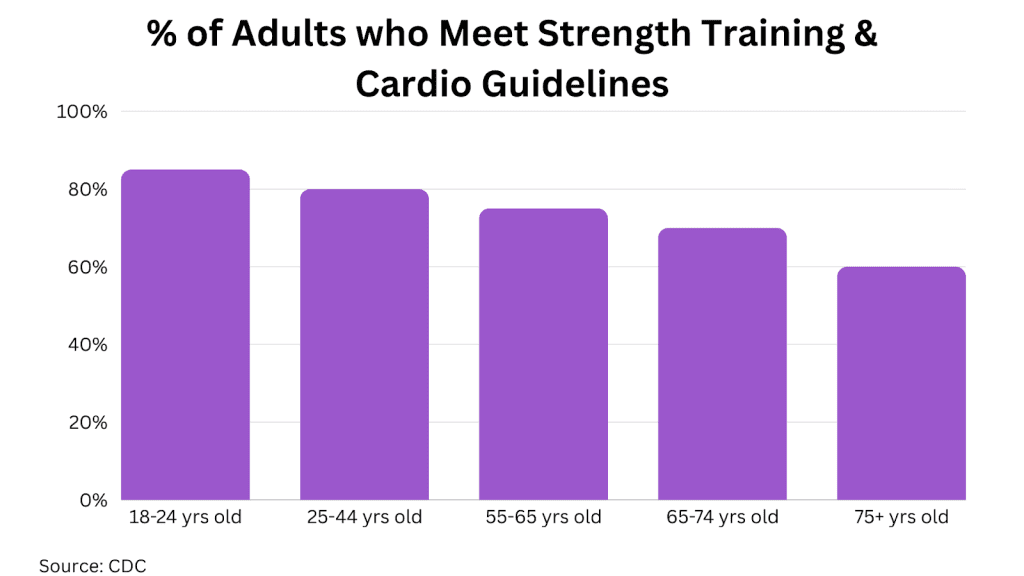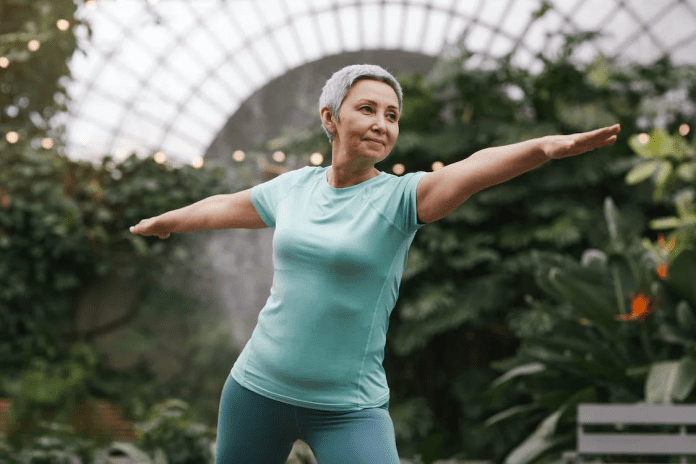Last Updated on January 29, 2024 by Asfa Rasheed
Getting enough high-quality sleep is crucial at any age. 3-month-old babies or younger need about 14 hours of sleep. Children aged 6-12 need 9-12 hours of sleep every day. Teenagers require at least eight hours, up to 10. Beyond that age, individuals need at least seven hours of sleep per day. Ultimately, adequate sleep is crucial for optimal daily functioning.
Nevertheless, numerous older adults find it challenging to achieve the recommended 7-9 hours of sleep each night. Poor sleep impacts overall health and quality of life. It can compromise their immune system and overall daily functioning. The good news? Regular exercise can help older adults fall asleep more quickly, sleep more soundly, and wake up recharged. Let us delve into how exercise can help older adults get better sleep.
Table of Contents
Why does sleep decline with age?
As we grow older, our sleep patterns change. Older adults often experience:
- More frequent nighttime awakenings
- Earlier rise times
- Daytime napping
- Less time spent in deep, restorative sleep
Some decline in sleep tends to be normal. But poor sleep exacerbates age-related health issues. Individuals can experience memory impairment, mood disorders, and reduced immunity. The key is identifying effective, long-term solutions to improve sleep.
Exercise: A Potent Sleep Aid

Extensive research confirms that regular exercise can increase total sleep time by over an hour. It can also improve sleep quality by 65% in older adults. According to professionals, they should practice for at least 150 minutes per week. But what makes exercise such a powerful sleep enhancer?
Optimizing Circadian Rhythms
Our internal circadian clock governs when we feel sleepy or alert during a 24-hour period. As we age, our circadian rhythms can become disrupted. Thus, it negatively impacts our sleep, which is important in senior care. Fortunately, exercise helps re-synchronize circadian rhythms.
Morning exercise aligns circadian rhythms for better nighttime sleep. Engaging in just 30-60 minutes of morning activity can significantly impact sleep quality. It reduces the time it takes to fall asleep by 75% and decreases nighttime awakenings.
Lowering Stress and Anxiety
Stress and worry disrupt sleep. It stimulates the individual’s “fight or flight” response before bed. The good news? Exercise is a tested and proven stress reliever.
Studies confirm just 30 minutes of daily physical activity slashes stress and anxiety levels. It can be reduced by up to 48% in older adults. Lower stress translates directly to improved sleep quality.
Regulating Core Body Temperature
Our body temperature naturally declines before bedtime, signaling it’s time to sleep. Exercise temporarily raises the core temperature. As the body then cools post-workout, increased blood flow to the skin enhances this natural decline.
The subsequent drop in core temperature after exercise leaves the body primed for sleep. Consequently, this leads to quicker sleep onset and an increased duration of deep, restorative sleep.
Tailoring Exercises for Older Adults
To maximize safe and effective sleep benefits, older adults should:
Moderate Activity Levels
Strenuous late-night workouts can overstimulate the body and make falling asleep more difficult. Low to moderate intensity exercise (like a brisk 30-minute evening walk) works best.
Mix It Up
Variety keeps exercise interesting and enjoyable. Try alternating between aerobic exercise, strength training, flexibility exercises, and balance activities. Just 30 minutes a day confers real sleep perks. Individuals should consult their respective physicians to recommend appropriate workouts.
Consider Physical Limitations
Low-impact activities accommodate sore joints or mobility issues. Examples of such activities are swimming, yoga, Pilates, and Tai Chi. Band workouts, body weight workouts, and dumbbell strength training are also popular exercises for older adults. Simple exercises done from a chair or just walking provide real benefits, like chair yoga. Tailoring activities to your unique health needs prevents injury.
Real-Life Successes
Many older adults have experienced the sleep-enhancing benefits of exercise! Take Barbara, 65, who began a regular morning walking routine with a friend after struggling with insomnia for years. Within 3 weeks, her sleep improved dramatically – she now falls asleep in under 20 minutes (rather than 2+ restless hours) and wakes up energized.
Or consider Paul, 70, newly retired and anxious about his flagging energy levels. On his physician’s advice, Paul joined a beginner Tai Chi class. Just 8 weeks later, Paul is sleeping a full hour more per night and naps less during the day. He feels like a new man!
These real-life examples emphasize the lifelong benefits of exercise, regardless of age or activity level.
Frequently Asked Questions
If you’re considering upping your activity game to sleep better, you likely have questions! We’ve got answers.
What’s the best time of day to exercise to improve sleep?
To maximize sleep-enhancing effects, engaging in moderate exercise 3 to 6 hours before bedtime works best. This allows time for the stimulating effects of exercise to dissipate so you feel sleepy at bedtime. That puts the ideal timeframe in the late afternoon or early evening.
Can gardening or housework count as exercise?
Absolutely! Any moderately intense activity helps regulate circadian rhythms. It also regulates body temperature, and more for better sleep. Examples of these activities include yard work, cleaning, and leisurely walking. Seniors without mobility issues should aim for at least 150 combined minutes per week of these activities to see sleep gains.
Are there good exercise options if I have arthritis, joint pain, or use a walker?
Yes. Chair exercises, water aerobics, and gentle yoga focus on flexibility. They can also improve strength and balance without taxing sensitive joints. And while condition severity differs, low-impact activities can benefit those with limited mobility. Experts suggest starting slowly and consulting your physician.
Start Sleeping Better Tonight
As the science confirms, exercise works wonders when it comes to enhancing sleep quantity and quality. Exercise triggers hormones and chemicals in our bodies that aid in improving sleep quality. Furthermore, there are exercise options suitable for almost every older adult, irrespective of their physical condition. Talk to your doctor about tailoring an exercise plan to your individual health needs. Then prepare to rest easy tonight!
















